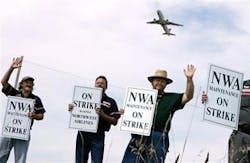Day four of the Northwest Airlines mechanics strike found little change in the debate over how well the carrier's highly touted "new airline" was actually faring in getting people from point A to point B.
Outside estimates of its performance painted an even less flattering picture of the Eagan-based airline's ability to function on time. And the carrier's flight attendants union raised questions about the quality of the job replacements are doing maintaining the carrier's fleet.
Northwest said it canceled 3.1 percent of its 1,473 flights Monday, or a total of about 45. That compares with an average cancellation rate of 16 per day in August 2004. Northwest continued to not provide information about late flights.
Joseph Brancatelli, publisher of the business traveler Web site Joe Sent Me (www.joes entme.com), said that according to his survey of 99 Northwest flights in the U.S. and Canada, just 37.5 percent of flights on Monday were on time. That's far below Northwest's 81.2 percent on-time performance for August 2004, according to the U.S. Department of Transportation.
The company has called Brancatelli's report unscientific.
Metropolitan Airports Commission spokesman Pat Hogan said Tuesday's flight activity out Minneapolis-St. Paul International Airport was a "carbon copy" of Monday. "There have been a few cancellations and some delays," but nothing extraordinary, he said. MAC operates the Twin Cities airport. Northwest has said it expects to complete about 96 percent of its daily operations this week as its 1,200 replacement workers and 350 managers work with outside vendors to maintain its fleet.
When it comes to operating on time, Northwest struggled Tuesday in some key markets, according to a survey of its Web site by the Pioneer Press.
That included one of its most critical business travel markets: flights between the Twin Cities and Chicago's O'Hare International. Northwest competes vigorously with American and United airlines there, and on Tuesday both of those airlines fared far better in operating timely flights.
Just two of Northwest's first nine flights to O'Hare were on time, according to the airline's Web site. Federal guidelines consider a flight to be on time if it arrives less than 15 minutes past its scheduled time.
Northwest flight 124, scheduled to arrive at 11:29 a.m. in Chicago, was 67 minutes late because of nonscheduled maintenance, according to the Web site. Two of the late flights are operated by Northwest's regional partner, Mesaba Airlines, which is unaffected by the strike.
From O'Hare to the Twin Cities, Northwest fared better. Seven of its first nine flights were on time. Flight 135, scheduled to arrive at 3:56 p.m., was 62 minutes late. Since the flight continued on to Omaha, Neb., that arrival also was late.
United, meanwhile, was running flawlessly during its first nine flights between the Twin Cities and O'Hare and its first seven flights from O'Hare to the Twin Cities. American reported two of its first eight Twin Cities-to-O'Hare flights were late; one of its first six O'Hare-to-Twin Cities flights was late. In another key business-travel market, the Twin Cities to New York's LaGuardia International Airport, two of Northwest's first five flights were late.
"We know they don't want to give out the numbers because they are ugly," said Brancatelli. But the scene didn't appear ugly at Minneapolis-St. Paul airport Tuesday afternoon. Some travelers noted delays but seemed to take them in stride.
Down on the airport terminal's baggage claim level, representatives from Minneapolis marketing firm J.T. Mega manned a welcome table for about 85 brokers flying in from around the country in to attend Jennie-O Turkey Store sales meetings in Willmar, Minn.
Of the 85 brokers, many experienced some delays in their flight arrivals, said Tracy Wedl, of J.T. Mega. But she added that there were no serious problems and that her group didn't need to contact Northwest for help.
Meanwhile, a flight attendants union spokesman Tuesday said members are expressing concern about the safety of the carrier's planes.
Members of the Professional Flight Attendants Association are calling union offices with comments about some work being done by the mechanics' replacements, spokesman Bob Krabbe said Tuesday. Members have made hundreds of calls, complaining that some of the airline's replacements don't know how to make some repairs and that delays are frustrating customers, Krabbe said.
"Many of our people have called in and said: 'We're concerned about flying on these aircraft,' " Krabbe said. The union represents about 9,700 flight attendants, and voted last week to keep working as mechanics went on strike.
The airline still is in negotiations with its other unions, including the flight attendants, as it tries to lower labor costs by $1.1 billion annually and avert a bankruptcy filing.
Northwest spokesman Kurt Ebenhoch said the company wasn't aware of the flight attendants' reports, but said replacement workers are "experienced and highly qualified professionals."
An Federal Aviation Administration spokeswoman said the carrier's contingency plan has posed no safety issues.
According to the FAA, 80 inspectors have been assigned specifically to Northwest with a pool of additional inspectors available if needed.
"Everything is going well, from a safety standpoint," said Elizabeth Isham Cory, a spokeswoman for the FAA. "We are pleased with what we are seeing."
A safety operations center set up by the Air Line Pilots Association, Northwest's pilots union, about a month before the strike is taking about 20 calls a day from members who have questions or concerns about maintenance, said union spokesman Will Holman. He couldn't say whether that number had increased since the strike started.
Copyright 2005 Associated Press





